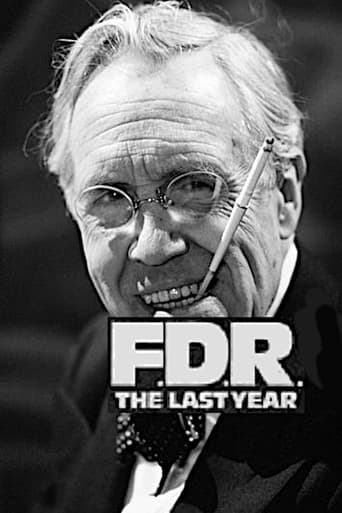

Why so much hype?
... View MoreThis movie feels like it was made purely to piss off people who want good shows
... View MoreA clunky actioner with a handful of cool moments.
... View MoreThe joyful confection is coated in a sparkly gloss, bright enough to gleam from the darkest, most cynical corners.
... View MoreJim Bishop was a very good popularizer of history. He wrote several books, concentrating on the events on a critical day (or remembered day) in history. His first had been "The Day Lincoln Was Shot", which was dramatized twice, once with Raymond Massey as Lincoln and Jack Lemmon as John Wilkes Booth, and once with Rob Lowe as Booth. He also wrote "The Day Christ Died", "The Day Kennedy Was Shot", and (at the end of his life) "F.D.R.: The Last Year". Slightly larger in scope, the story discussed how F.D.R.'s failing health (his physicians realized he would live a year of so after April 1944) was not revealed to him totally. We were in the middle of World War II, and Roosevelt (Jason Robarts) was the indispensable man to lead the allied crusade. But 1944 was not only a key year in the war against the Axis, but an election year for the Presidency.Bishop (as one can see from what I just said) was working with a great deal of released, previously hidden information. Roosevelt's extra-marital affairs were discussed here (in one scene he is kissing Lucy Mercer Rutherford - Kim Stanley - in his automobile). Eleanor (Eileen Heckart) is aware of his infidelities (the emotional love of this relationship is long gone) but he does trust her as an extra pair of eyes and ears, informing him of national conditions (or international ones).The business about the political campaign (which Roosevelt treated as a foregone conclusion - he did threaten to resign the Presidency for health reason (not knowing his actual condition) unless certain policy views were kept in the party platform. His campaign rival, Republican Thomas E. Dewey of New York (Kenneth Welsh) was twenty years younger than FDR, and kept pushing the issue of bringing in youth and vigor to the war effort and to government. Dewey was defeated (like Hoover, Landon, and Wilkie before him) and sends a congratulatory telegram to Roosevelt. "Magnanimously" F.D.R. thanks the New York Governor for his good wishes at the end of the campaign. Then he turns to his military aid, General "Pa" Watson (Edward Binns), and says in confidence, "That little bastard ran the dirtiest political campaign in our history." The cast was tip-top, particularly Robarts, who showed the aging, human side to the great leader. The gradual realization by the government that the doctors had not told the whole story comes out, as can be expected, when Roosevelt faces Joseph Stalin (Nehemiah Persoff) at Yalta. Before his own last days at Warm Springs, Roosevelt was aware he gave away too much there, and was planning to bring Stalin to heel. But one truly is left wondering, despite his will, whether he would have had the physical strength to do so.An excellent television historical drama, which deserves to be re-shown again.
... View More